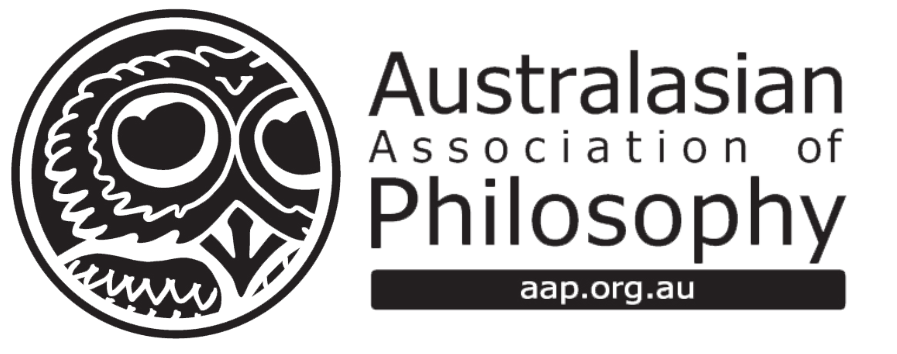
Postgraduate Presentation Prize
Sponsored by Taylor and Francis.
Awarded for the best paper presented by a postgraduate student at our annual conference. Awarded to encourage postgraduates to present at the conference, and to recognise the philosophical contributions from excellent postgraduate students.
SUBMISSIONS NOW OPEN
Information, Judging Criteria and Entries
2025 Winner

Conor Leisky
Australian National University
'Bad food and immoral tastes'
2025 Shortlist

Tommy Ness
University of Melbourne
'Demeriting Labels and the Reproduction of Social Hierarchy'
Corey McCabe
Australian National University
'The Exclusionary Power of Authoritative Commands'

Conor Leisky
Australian National University
'Bad food and immoral tastes'

Alexander Forbes
Monash University
'Distributing the Costs and Benefits of Children'
2024 Winner

Jeremy Strasser
Australian National University
'A view of induction from the standpoint of time-stationary stochastic processes'
2024 Commendation

Stephen Enciso
Charles Darwin University
'Can sovereignties 'co-exist'? The interpretive challenge in the Uluru Statement'
2024 Shortlist

Theodore Murray
Australian National University
'Balancing Blame's Epistemic Norm'

Bryson Ng
Nanyang Technological University
'Moral Progress and the Epistemic Vices of Corporations'

Stephen Enciso
Charles Darwin University
'Can sovereignties 'co-exist'? The interpretive challenge in the Uluru Statement'

Jeremy Strasser
Australian National University
'A view of induction from the standpoint of time-stationary stochastic processes'
2023 Winner

Shalom Chalson
Australian National University
'Discounting People for Reasons that Shouldn't Count'
If by ‘discrimination’, we mean something moralised, discrimination is necessarily morally wrong. At least one of its conditions must point to its wrongful nature. In this paper, I consider one explanation for why discrimination is wrong—agents treat persons differently without adequate justification. In particular, I consider what it means to treat people differently for the wrong reason(s). I argue that in the context of discrimination, an agent wrongfully differentiates iff they treat persons differently on account of attributes evidentially irrelevant to a legitimate goal. I call this the Irrelevant Attribute Thesis. I examine some consequences of this claim, and compare it with a rival proposal.
One may instead think that an agent wrongfully differentiates iff they treat people differently on account of socially salient attributes. I call this the Social Salience Thesis. I provide reasons to reject this view: it is too narrow to capture an adequate range of cases, and doesn’t reveal what counts as a wrong reason to treat people differently. In contrast, the Irrelevant Attribute Thesis is extensionally adequate, and doesn’t preclude the influence of social salience in moral evaluation. More importantly, it tells us what counts as a wrong reason to treat people differently.
2023 Shortlist

Jonathan Edwards
University of Queensland
'Solidarity: A Core Virtue of Humanitarianism?'
Corey McCabe
Australian National University
'Participatory Political Obligations'
2022 Winner

Nick Willis
Australian National University
'Innovating over gappy resources – blame and hermeneutical injustice'
A hermeneutical injustice (Fricker 2007) occurs when a gap in shared resources leaves an agent unable to make her experience intelligible to herself or others. On Fricker’s account, no individual is culpable for hermeneutical injustices (2007, 2013, 2016). This is because community-level structures determine the shared resources we use to make our experiences intelligible – e.g. shared languages, concepts, standards of evidence. No individual has control over community-level structures, so no individual is responsible for any gaps in shared resources. Contra Fricker, I argue that, for communicative hermeneutical injustice, individuals often do have control over the resources used to make their experiences intelligible to others. When we encounter gaps in a common language (like ‘English’), language users innovate across those gaps. If a hearer rejects a suggested innovation, they might be culpable for preserving a gap in shared resources. Fricker (2013, 2016) has responded to similar arguments (e.g. Medina) by arguing that these are not cases of hermeneutical injustice. My account avoids this response. Every case of communicative hermeneutical injustice is an instance of failed linguistic innovation.
2022 Shortlist
Meg McCamley
Deakin University
'Enactive Behaviour Analysis'
The enactive approach to mind argues that cognitive systems are self-organising processes that entail intrinsic teleology. That is, the activity of cognitive systems, their interactions with the environment, are always directed towards the maintenance of the cognitive system itself. However, enactive theorists have not yet developed a scientifically reputable method for explaining this teleological activity, instead relying on an anthropomorphic phenomenology to account for teleology across the phylogenetic spectrum. Thus, following suggestions made by Barrett (2016, 2019) & Reynolds & Alksnis (2019), this paper intends to make plausible the suggestion that B.F Skinner’s experimental method of behaviour analysis can be used to explain the meaning or purpose of a cognitive systems interactions with its environment (i.e., its behaviour).

Raphael Morris
Australian National University
'Sealioning: A Discursive Autoimmune Disease'
Sealioning is a form of harassment that involves persistent questions or demands for evidence. By pestering the victim until they lose patience, sea lions give the impression that their victims are unwilling or unable to engage in cooperative inquiry. This has numerous harms beyond merely wasting the victim’s time and energy; by sending bad signals about who is and isn’t cooperative, sealioning is a major threat to discursive coordination. In this paper, I examine the purposes of sealioning-talk to derive two desiderata for an adequate philosophical analysis of sealioning. First, sealioning constitutes a discursive wrong. Second, sealioning uses persistent demands for justification to present its target as uncooperative. I then harness the notion of linguistic trust to explain both why persistent demands for reasons present a target as uncooperative and why this is inappropriate in the case of sealioning. Finally, I propose a higher-order norm of discourse that mandates responsiveness to the reasons to extend linguistic trust, and offer a philosophical definition of sealioning according to which it is a particular kind of violation of this higher-order norm.

Brandon Yip
Australian National University
'What is Moral Disgust?'
Some things are disgusting but not morally disgusting. Eating your snot is disgusting but not morally disgusting, while operating a scam that targets the old and vulnerable is morally disgusting but not necessarily physically disgusting. Moral disgust is an adaptation of regular disgust that is marshaled against distinctively moralised phenomena. How exactly should we characterise the morally disgusting? In this talk, I argue against two prominent accounts (Plakias' (2013, 2018) Social Contamination account and Kumar's (2017) Reciprocity Failure account) in favour of my own. I suggest that for an act to be morally disgusting is for it to be socially corrosive: the act is such as to undermine the intelligibility of the normative structure of a community. I will show how this makes intelligible instances of moral disgust including those towards human cloning and incest. The reason why we find these disgusting is not because they involve reciprocity failures or will be become if not kept in check, but because they threaten an operative normative framework that revolves around a certain ideal of child rearing and the sanctity of family life.
2021 Winner

Mitchell Barrington
Australian Catholic University
Ignoring the Improbable
Many problems in decision theory appear to be solvable if agents simply ignore some possibilities. The utility of this approach has given rise to a substantial number of theories endorsing “thresholdism”: the view that possibilities whose probability is below a particular threshold should be discounted entirely. This paper argues that ignoring possibilities—even extremely remote ones—comes at a hefty cost for one’s ability to make rational decisions. First, the approach is inescapably partition-sensitive: agents will undertake different acts depending on how the world is described. Second, agents become insensitive to differences in the probability of excluded states; they will be indifferent between taking a small risk and an even smaller risk. Third, agents become insensitive to differences in the value of outcomes in excluded states; they will be indifferent between risking a bad outcome and an even worse outcome. And fourth, excluding a state affects the expected value of all acts to which the state is relevant, generating implausible prescriptions for peripheral acts. For instance, agents will not take any bet on the excluded state, since they have assigned it a probability of zero.
2021 Shortlist

Riley Harris
University of Adelaide
Weak Comparability
How ought we to act when we are uncertain about morality? Arguably, we should be sensitive to the moral stakes according to various moral theories (perhaps by maximising expected moral value). Stake-sensitivity has appeal but may entail an implausible view about the comparability of judgements across moral theories. To be sensitive to stakes we must compare stakes. One response would be to construct comparability by normalising theories according to their statistical properties. I argue that this response fails to account for our intuitions about stake sensitivity. Rather than trying to defend a strong claim about intertheoretic comparisons we might defend a weaker claim. This weaker claim is one that everyone should accept.

Madeleine Shield
University of Queensland
Can we Force Someone to Feel Shame?
For many philosophers, there is a tension inherent to the experience of shame as an inward-looking, yet intersubjective, emotion: that between the role of the ashamed self and the part of the shaming Other in pronouncing the judgement which results in shame. Simply put, the issue is this: either the perspective of the ashamed self takes precedence in autonomously choosing to feel shame, and the necessary role of the audience is left unaccounted for, or else the view of the shaming Other prevails in heteronomously casting the shame, and the ashamed individual’s agency becomes problematically understated. It is my contention in this paper that both sides of this debate are mistaken; in fact, I argue that the very distinction between autonomous and heteronomous shame is itself fundamentally misguided. In essence, this is because it is reductive to think that shame must be exclusively contingent upon either the perspective of the self or that of the Other; it is in fact dependent upon both at once. This is the ‘double movement’ of shame: it is an appraisal of the self that is at once social and private, originating within one’s relation with others and subsequently echoed within one’s relation with oneself.

Brandon Yip
Australian National University
The Social-ideal Account of Shame
Shame is painful, pervasive and puzzling. It is an emotion that is clearly more than a mere brute feeling, and yet it is difficult to pin down what it means to feel shame. Accordingly, the last few decades have seen a proliferation of rival attempts to provide an account of shame. I provide yet another attempt here: the social-ideal account of shame. Briefly, someone feels shame when they take it that they have failed to exemplify some interpersonal ideal to which they are committed. Where an ideal is interpersonal when (1) it is an ideal of a role that one assumes in some interpersonal relationship and (2) exemplification of that ideal depends partly on the attitudes of others. I show how this account captures the various aspects of shame and defend it against rival accounts. I then explore the implications of this account for a defense of the moral value of shame.
2019 Winners

Ross Pain & Szymon Bogacz - Australian National University
Analyticity and easy ontology
Neo-Carnapianism is undergoing a resurgence in contemporary metaontology. One prominent defender of neo-Carnapianism is Amie Thomasson (2015). Analyticity plays an important role in Thomasson's view; however, analyticity is still a controversial notion. In particular, Timothy Williamson (2008) develops a powerful argument against it. Both Thomasson and Williamson are concerned with an epistemological notion of analyticity. We distinguish between epistemological-analyticity and formal-analyticity. We argue that formal-analyticity is immune to Williamson's critique. We then show how the notion can be put to use by giving a deflationary account of properties inspired by Thomasson's framework. Given this, we suggest that neo-Carnapians have strong reasons to prefer formal-analyticity over epistemological-analyticity.
2019 Shortlist

Inês Hipólito
University of Wollongong
Perceiving and Cognising: Re-Drawing the Boundaries
This paper reviews three distinct ways of drawing the perception/cognition boundary. The traditional modular sharp boundary has been recently brought to question most prominently by predictive processing theories. This is because such theories assume that even at the lowest levels perceiving can be informed by the content of the perceiver's background cognizing. However, as this paper demonstrates, even if we abandon modular theories of perception and embrace many of the lessons of the predictive processing framework, it is possible that there is a strong perception/cognition boundary. To make this case, the paper starts by reviewing what motivated modular theories to draw a sharp boundary and detailing the challenges such theories face. The paper then briefly introduces the new contender – the predictive processing account of perception. It will be shown how purely cognitivist predictive processing offers an inverted theoretical foundation for understanding how perception and cognition mutually inform one another. There are reasons, however, to think that perceiving is sometimes not informed by cognising, which is yet an explanatory difficulty to the purely cognitivist account of predictive processing. The last section then claims that this problem can be overcome if some forms of perceiving are not contentful and, for such reason, it cannot be intelligibly informed by the contents of cognising. Radical enactivism offers a way of doing so in recognising a distinction between two forms of perceiving: contentful and contentless. The cost of adopting such an approach is that it requires us to re-conceive and re-draw the boundaries between perceiving and contentful cognizing yet again.

Matthew Joseph
The University of Sydney
Duties and Privileges: Reconsidering States’ Rights of Exclusion
Many political philosophers argue that nation-states have the right to unilaterally determine and enforce their own immigration policies. This ‘right to exclude’ is taken to be a particularly robust right, granting states the moral authority to deploy their defensive military capabilities against civilian non-citizens. In this paper, I reconsider the right to exclude in light of a Hohfeldian analysis of both the state’s right to exclude and human rights. On my view the state’s right to exclude is a privilege, and human rights are a claim-right imposing duties on states. If this analysis holds, then taking human rights seriously means that states have human rights duties that restrict their range of permissible exclusion practices. Rather than being a strong right to control the movements of human beings, the right to exclude is just the moral permission to do those things that it is not duty-bound under human rights obligations not to do.

Adam Piovarchy
The University of Sydney
Hypocrisy, Standing to Blame and Normative Powers
This paper examines why hypocrites lack the standing to blame others for certain wrongs. I first examine previous uses of the term ‘standing’, and note these all centre around the idea of entitlement. I argue that thinking of standing to blame as a moral entitlement faces problems. I then consider whether we can find an explanation for why hypocrites lack the standing to blame from within the moral responsibility literature on appropriate blame, and argue we can not. By examining how the concept of standing is used in other contexts, I argue we should think of standing to blame as a status which grants agents the ability to do certain things. Whilst hypocrites clearly can blame, they lack the normative power to change others’ obligations through the making of demands that we ordinarily make in blaming. This is because hypocrites lack the authority to make such demands.
2018 Winner

Heather Browning
Australian National University
The lion or the lungfish: making intersubjective welfare comparisons
Animal welfare science gives us methods for measuring the welfare of individual animals. Frequently, we want to compare these measures between individuals, of the same or different species, but this can be difficult as we cannot know whether individuals experience the same degree of welfare or if this is reflected in the same way in their measurable responses. In this paper I argue that in order to make comparisons, we must make similarity assumptions about the individuals we are comparing, which can be justified through appeal to analogy, shared evolutionary history and parsimony. This will allow us to make comparisons of individuals within a species, but for cross-species comparisons we may need to instead rely on other methods of decision-making.
2018 Shortlist
Kai Tanter & William Tuckwell
Monash / Melbourne
![]() SCOREKEEPING TROLLS
SCOREKEEPING TROLLS
Keith DeRose (1992, 1995, 2002, 2004, 2009) defends contextualism; the view that the truth-conditions of knowledge ascriptions vary with the context of the ascriber. Mark Richard (2004) has criticised contextualism for not being able to vindicate intuitions about disagreement. In order to account for these intuitions DeRose has proposed a single scoreboard semantics that he labels the Gap view (2004, 2009). According to this view, ‘S knows that p’ is true iff the personal epistemic standards of every conversational participant are met, false iff the personal standards of every conversational participant are not met, and truth valueless iff some standards are met but others are not. An implication of this view is that the presence of participants in a conversation with standards that diverge from those of other participants often results in knowledge ascriptions lacking a truth value. This allows for people with divergent standards to enter conversations and thereby undermine the truth of knowledge ascriptions. We use the metaphor of “trolling” to characterise this phenomenon. We argue that this result, when combined with numerous plausible knowledge norms – the knowledge norms of assertion, action and belief – results in unacceptably counterintuitive implications and that this constitutes a reductio ad absurdum against the Gap view. We proceed as follows. In section 1 we describe contextualism. In section 2 we describe Richard’s disagreement objection to contextualism. In section 3 we describe DeRose’s response to the disagreement objection, namely, the Gap view. In section 4 we draw out counterintuitive implications of the Gap view itself. In section 5, we show that the Gap view, in conjunction with DeRose’s commitment to various knowledge norms, leads to further and even more so counterintuitive implications. In section 6, we conclude that these implications lead to a reductio against the Gap view.
Nathaniel Gan
University of Sydney
Breaking Ontological Stalemate
Mark Balaguer (1998) argued that we will never be able to settle the question of whether mathematical objects exist. His argument depends on the following premise: A reason to prefer either realism or anti-realism about mathematics requires that the two positions disagree on something other than mathematical ontology. In this paper I argue that this premise is mistaken. I suggest that, in any ontological debate, it is possible to construct a form of realism and a form of anti-realism such that the two views agree on everything except over the existence of the entities in question. If Balaguer’s argument were sound, therefore, it would prove too much—it would imply that many other ontological debates end in stalemate as well. I suggest, instead, that even if two ontological views agreed on everything except ontology, there might still be reasons to prefer one view. For, in adjudicating between two ontological positions, we should consider not only how much each can account for, but also whether the views bear virtues such as intuitiveness and simplicity. With these factors taken into consideration, we might find reasons to break the stalemate between mathematical realism and anti-realism.

Lachlan Walmsley
Australian National University
Everything wrong with multi-model idealisation
Scientific models are powerful tools for reasoning through assumptions, building theories, and making inferences about the real world. But models are made only with the help of simplifications and distortions known as idealisations. 1 In this paper, I endorse a revised version of Michael Weisberg’s account of idealisation (Weisberg 2007, 2013). On that view, there are three kinds of idealisation: Galilean idealisation, minimalist idealisation, and multi-model idealisation (MMI for short). Here, I argue that Weisberg’s notion of MMI is not a kind of idealisation at all, but robustness analysis: a procedure for reducing uncertainty. In light of these objections, we may consider rejecting Weisberg’s view entirely for an alternative, such as Angela Potochnik’s (2017) account. In the last part of the paper, I argue that a Weisbergian view should not be rejected just yet as its still gets explanatory purchase on important instances of modelling in climate science.
2017 Prize Winner

Hayden Wilkinson
Australian National University
Expending with expansionism
When faced with infinite total value, as in the universe we inhabit, consequentialist moral theories appear to imply nihilism [Nelson 1991; Smith 2003; Bostrom 2011]. To retain some form of consequentialism then, but avoid nihilism, we must somehow modify our theory to hold up in infinite settings without departing too much from our basic intuitions. Foremost among the modifications so far proposed is the expansionist approach of Vallentyne and
Kagan [1997] and also Arntzenius [2014]. Although expansionist theories do make judgements which are plausibly true, this paper demonstrates that, when applied in situations involving relativity, they entail a difficult trilemma. They require that we accept: a peculiar form of moral relativism; the impossibility of completeness; or the dismissal of transitivity, whereby agents are permitted to make the world strictly worse by being morally Dutch-Booked. None of these options allow for a viable moral theory, and expansionism therefore fails to rescue consequentialism from its infinitarian plight.
2017 Shortlist
Nick Brancazio
University of Wollongong
The Extensive Reach of Gender: Agency and Interaction
Enactivism is the position that cognition is a dynamic relationship between an agent and the environment. On this framework, agency can be thought of as ongoing, action-oriented, and phenomenologically fundamental. My concern in this paper will be the way that gender structures agency on an enactive framework. First, I will look at two kinds of agency: minimal agency and narrative agency (Gallagher 2012), which roughly correspond to work on minimal and narrative selves (Zahavi 2010). Next I will explain the influence of narrative agency on minimal agency through work on intention-formation. After a discussion of the role of gender in narratives, I’ll offer three ways in which gender can be said to influence the minimal sense of agency.
Vincent Le
Deakin University
Reading Descartes’ Modern Break as a Return to Augustine
Descartes is often interpreted as having decisively broken from medieval philosophy’s appeals to scripture by turning to rational demonstrations (Gaukroger 1995). Nonetheless, several commentators maintain that this reading overlooks Augustine’s influence on Descartes (Menn 2002). This paper reconciles these views by showing how Descartes is modern BECAUSE he is medieval. We begin by elucidating how both readings overlook that medieval philosophy is not homogenous, but divided between two traditions of Augustinianism and Thomism. We will therefore recapitulate Augustine’s Neo-Platonic arguments for God’s existence by doubting his own, only to affirm himself as a doubting thing, and verify God as the superior standard after which we strive. We then examine why Aquinas appropriates Aristotle’s empirico-analogical method of inferring God’s existence from his sensible traces. By clarifying how Augustine methodologically differs from Aquinas, we shall demonstrate that Descartes breaks with Aquinas’ empiricism—albeit, only by returning to Augustine’s even more ancient rationalism.

Adam Piovarchy
University of Sydney
Responsibility and Obedience to Authority
Milgram’s (1963) Obedience to Authority experiments have shown that 65% of people will electrocute a stranger to death when instructed to do so by an authority figure. Most philosophers agree subjects in these settings are morally responsible for their actions. This paper will argue for two conclusions. First, there is empirical evidence that if minor changes were made to Milgram’s setup, 95% of people would obey in such settings. As a result, the original 65% figure should not be treated as a maximum possible obedience rate, but simply the highest demonstrated rate so far. Second, observing this higher obedience rate makes it inappropriate for almost anyone in the moral community to hold the obedient subjects responsible for their actions, despite subjects still being morally responsible for their actions. This is because we lack the standing to hold someone responsible for something that we ourselves would have done.

Lachlan Walmsley
Australian National University
Minimally Mechanistic Explanation: Lessons from the true slime mould Physarum polycephalum
The basic mechanistic approach to explanation assumes that target systems have a spatiotemporal organisation similar to that of a classical machine like a car engine or watch. Many biological systems, like Physarum polycephalum, are importantly unlike these machines. Derek Skillings argues that classical machines score high on measures of isolability, organisation, and sequentiality, while systems like Physarum score low. He then distinguishes between paradigm cases (high scorers) and marginal cases (low scorers). On this view, Physarum is, at best, a marginal case and looks ill-suited to mechanistic explanation. In this paper, I take another approach to mechanistic explanation, which I call minimally mechanistic explanation. These are defined by properties of mechanistic explanations rather than the properties of their target systems. Minimally mechanistic explanations are decompositional, causal, spatial, and world-facing. This framework fits some marginal cases, like predator-prey dynamics as easily as it does paradigm cases, but still struggles with Physarum.
2016 Winner

Stephen Gadsby
Macquarie University
'Anorexia Nervosa and the Oversized Experience'
"Anorexia Nervosa patients have a distorted experience of their body size. In the Anorexia literature this ‘oversized experience’ is referred to as a ‘body image disturbance’. Recently, new evidence has surfaced showing Anorexia patients have a distortion in their body schemas, a body representation used for motor control and planning. In this paper I discuss this new evidence and explore what kind of ‘oversized experience’ it results in. I argue it causes Anorexia patients to experience their bodies as oversized through the faulty perception of affordances in their environments. This reconceptualised ‘oversized experience’ cannot be captured by the term ‘body image disturbance’.
I also argue that propositional attitude formation in Anorexia can be accounted for with an empiricist model. Adopted from the literature on monothematic delusions, empiricist models explain abnormal beliefs as grounded in abnormal experiences. I argue that the propositional attitudes Anorexia patients have about their body size are grounded in the oversized experience."
2016 Shortlist

 Adam Piovarchy
Adam Piovarchy
University of Sydney
'Blaming the Excused: Reactive Attitudes and Causal Responsibility'
Recently, Doris and Murphy (2007) have argued that the soldiers involved in committing atrocities at Abu Ghraib prison and in the My Lai massacre may have been cognitively degraded, and if so should be excused for their actions. Talbert (2009) has responded that even if this argument is successful, on a reactive attitudes approach to moral responsibility the soldiers are still responsible for their actions as they are appropriate targets of our reactive attitudes. In this paper, I will resolve this tension. I will argue that Talbert has misdiagnosed the target of our reactive attitudes. By reflecting on arguments regarding William’s lorry driver (1981) I argue reflection on our moral practices reveals that mere causal responsibility is sufficient for the imposition of new duties of reparation. If an agent fails in these new duties, they thereby display poor quality of will to the victim, and are thus fitting targets of the reactive attitudes.

Lachlan Walmsley
Australian National University
'Please Explain – Radical Enactivism’s Explanatory Debt'
Radical Enactivism (Hutto & Myin 2013) is a position in the philosophy of cognitive science that aims to displace representationalism, the dominant position in cognitive science for the last 50-60 years. To accomplishing this aim, radical enactivism must provide an alternative explanation of cognition. Radical enactivism offers two alternative explanations of cognition. The first I call the dynamical explanation and the second I call the historical explanation. The mechanists have given us reasons for doubting that the first alternative makes for a good explanation (e.g. (Kaplan 2015; Kaplan & Bechtel 2011). The historical explanation does not hit the right explanatory target without the introduction of a proximate mechanism, but the proximate mechanisms suggested by radical enactivism are associationist mechanisms, the limitations of which led to the intial widespread endorsement of representationalism. Therefore, radical enactivism cannot displace representationalism in cognitive science.
2015 Winner

Tristram Oliver-Skuse
University of Melbourne
'Anger Felt towards a Bin-Licking Dog'
This paper offers a defence of Peter Goldie's notion of emotions as 'feeling-towards' to suggest an account of phenomenology as grounding emotional intentionality in a way that does not rule out the possibility of our emotions being opaque to us.
2015 Shortlist
Ross Pain
La Trobe University
'A Metalinguistic Defence of Strong Deflationism'
Linus Huang
University of Sydney
'The Nativist Input Problem: Why Evolutionary Psychology Still Can't Explain Human Intelligence'
Millicent Churcher
University of Sydney
'Beyond Empathy: Adam Smith on the Sympathetic Imagination'

The AAP awards a monetary prize for the best paper presented by a postgraduate student at our annual conference. This prize is offered to encourage postgraduates to present at the conference, and to recognise the philosophical contributions from excellent Australasian postgraduate students.
Judging Criteria
Shortlisted candidates will be judged on both the written paper quality and the presentation skill displayed in presenting the paper to a conference audience, in particular the following;
Argument (internal quality/merit thereof).
Writing (overall clarity and coherence).
Novelty/originality.
Impact (significance in relation to debates in the field).
Overall presentation skills.
Eligibility
AAP Postgraduate members enrolled in a philosophy HDR program in an Australasian University (includes Australia, New Zealand and Singapore) who have registered for the conference and are presenting a paper are eligible to enter the AAP Postgraduate Presentation Prize and be involved in the Postgraduate Mentoring Scheme.
Applicants must submit a full paper, prepared for blind review, of between 3000-5000 words (incl. references)
In addition:
1. Applicants must be members of the AAP in good standing.
2. Applicants must be enrolled in an Australasian HDR philosophy program (PhD or MRes).
3. Applicants must not be previous winners of the AAP Postgraduate Presentation Prize.
4. The submitted paper must not be previously published.
5. Applicants cannot submit more than one paper in any given year.
6. All papers must conform to the word limit.
7. All papers must be properly prepared for blind review.
Students are eligible if their theses submission date falls after the closing date for submissions.
Applications:
Submission deadline: Thursday 30 April 2026, 8pm AEST
SUBMIT YOUR ENTRY HERE
After the deadline, a judging panel will review all submissions and make a short-list of entries. Short-listed applicants will have their conference fees returned. Members of the judging panel will attend the presentations by the short-listed applicants. The winner will be chosen based on both the quality of the submitted paper and the quality of the conference presentation. The winning paper will be announced at the conference and receive a prize of $500, and the option of having their winning paper published online on the AAP website.
Short-listed applicants will be notified by Thursday 28 May 2026.
The AAP reserves the right not to award the prize in any given year if a suitable candidate is not nominated.
Full details on Policy & Procedure can be found HERE (Requires Member Login)
This prize requires the collection of personal information. The way this personal information is used and distributed is detailed in the AAP Privacy Policy which can be found HERE. The AAP Privacy Policy forms part of the terms and conditions of this prize. By submitting a nomination, an applicant agrees to the usage of personal information as defined in the AAP Privacy Policy. Those nominating a third party for the prize should pay special attention to their obligation in notifying the third party of the usage and disclosure of their information as defined in the AAP Privacy Policy.
All enquiries to: admin@aap.org.au

